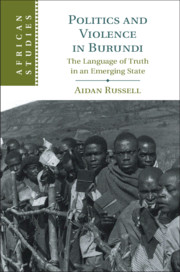Book contents
- Politics and Violence in Burundi
- African Studies Series
- Politics and Violence in Burundi
- Copyright page
- Contents
- Figures and Maps
- Acknowledgements
- Linguistic and Orthographic Note
- Glossary of Terms
- List of Abbreviations
- Introduction
- Prologue, 1796–1959
- Part I 1959–1961: ‘To See the Son of a King’
- Part II 1961–1967: ‘A Most Total Anarchy’
- Part III 1968–1972: ‘Please Send Me a Car to Take Them Away’
- Conclusion
- Bibliography
- Index
- African Studies Series
Introduction
Talking Politics and Watching the Border
Published online by Cambridge University Press: 03 October 2019
- Politics and Violence in Burundi
- African Studies Series
- Politics and Violence in Burundi
- Copyright page
- Contents
- Figures and Maps
- Acknowledgements
- Linguistic and Orthographic Note
- Glossary of Terms
- List of Abbreviations
- Introduction
- Prologue, 1796–1959
- Part I 1959–1961: ‘To See the Son of a King’
- Part II 1961–1967: ‘A Most Total Anarchy’
- Part III 1968–1972: ‘Please Send Me a Car to Take Them Away’
- Conclusion
- Bibliography
- Index
- African Studies Series
Summary
The introduction presents the book’s primary themes of truth, the postcolony, borders and violence. Situated in the historiography of African decolonisation, it emphasises the necessity of considering the emergence of the postcolony in the relationship between states and peoples, rather than through the relationship with the coloniser alone. It treats decolonisation as a search for certainty around what community and authority would mean in the postcolony, a process lasting far beyond the date of independence. Surveying approaches to citizenship as action and as words, it focuses on variations of political language in historiography and linguistic anthropology, and contextualises the setting of the book in literature on African borderlands and the ‘margins’ of the state. It provides preliminary observations on truth, truth-speaking and their role in official political speech and unofficial rumour in 1950s Burundi, while observing some common philosophical conceptions of the relationship between truth and violence. It then presents the methodologies employed, along with the practical and ethical questions concerning the focus on truth, and ends with an overview of the book.
- Type
- Chapter
- Information
- Politics and Violence in BurundiThe Language of Truth in an Emerging State, pp. 1 - 38Publisher: Cambridge University PressPrint publication year: 2019

